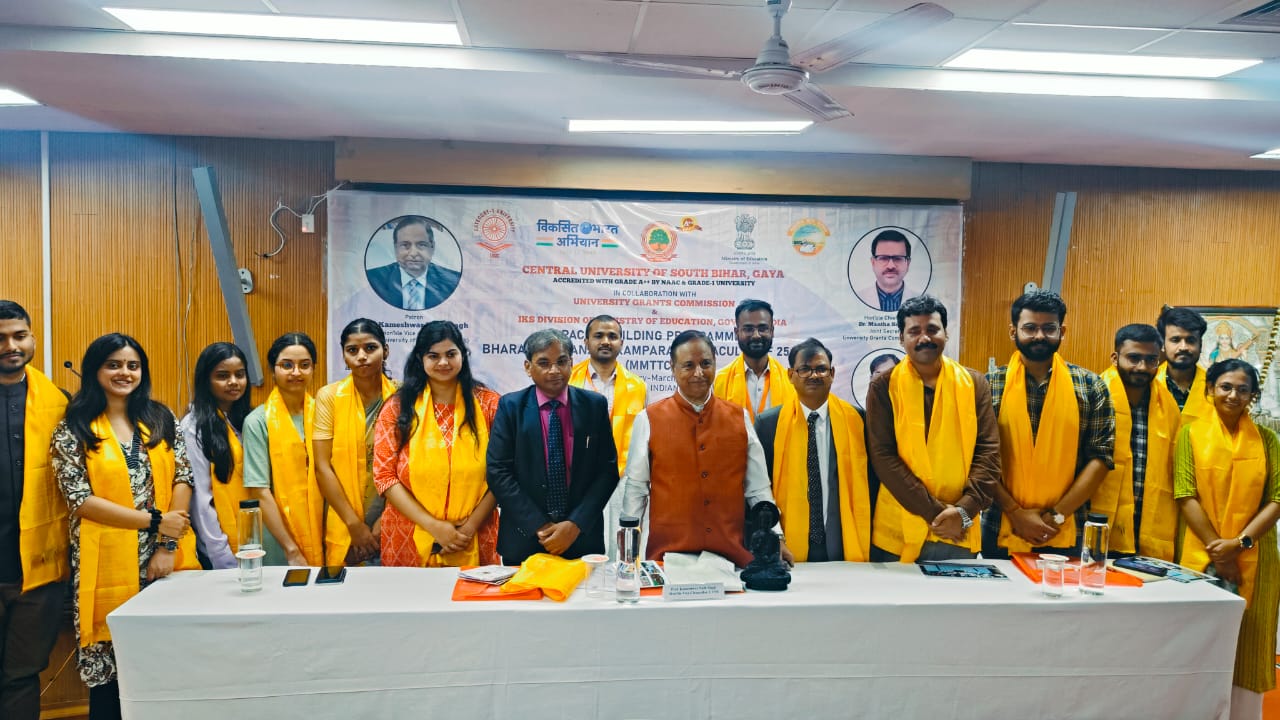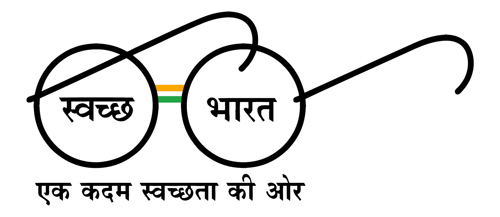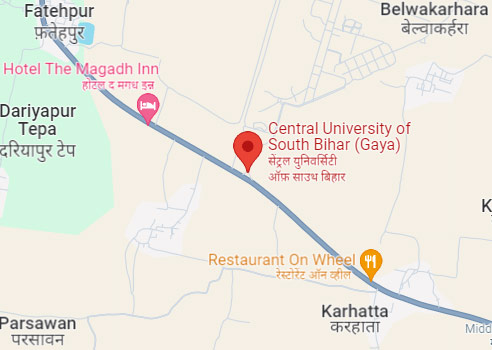Capacity Building Programme on Bharatiya Jnana Parampara, March 08-13, 2025
CUSB Inaugurates Capacity Building Programme on Bharatiya Jnana Parampara
Central University of South Bihar (CUSB), in collaboration with the University Grants Commission (UGC) and the IKS Division of the Ministry of Education, Government of India organised six-day Capacity Building Programme on Bharatiya Jnana Parampara (Indian Knowledge System) at VLC Auditorium. The programme aimsed to provide faculty members with deeper insights into India's rich intellectual traditions and their relevance in contemporary education. The ceremony commenced with a welcome speech, the lighting of the lamp, and the university’s Kul Geet. Following this, the guests participated in the symbolic ritual of filling water in the Amrit Kalash, signifying the eternal flow of knowledge, wisdom, and prosperity. This act represented the preservation and nourishment of India’s intellectual heritage, reinforcing the importance of sustaining and passing on traditional wisdom to future generations.

Delivering the keynote address, the Chief Guest Shri Sudeep Singh Jain, Financial Advisor, University Grants Commission (UGC), emphasized the importance of integrating ancient Indian wisdom into modern education. He congratulated CUSB for being one of the 15 universities selected for this prestigious initiative and discussed how India has always been a hub of intellectual and scientific advancements. He cited India's historical contributions to mathematics, astronomy, medicine, and environmental conservation, mentioning the works of Aryabhatta, Rishi Kanad, and ancient Indian metallurgical techniques. He further stressed that self-reliance and sustainability were key aspects of India’s traditional knowledge system, which can provide solutions to modern challenges in education, environment, and technology.
Prof. Kameshwar Nath Singh, Hon’ble Vice-Chancellor, CUSB, in his presidential address, spoke about the need to decolonize the education system and revive India’s academic heritage. He pointed out that the British colonial system systematically eroded India’s indigenous knowledge base, replacing it with a Western-centrism model of education. He highlighted that India’s knowledge traditions have made significant contributions across all disciplines, and it is time to reclaim and integrate them into the modern academic framework. Stressing the importance of Indian languages, he noted that languages like Sanskrit and Tamil hold vast repositories of knowledge that must be preserved and promoted. He also reflected on the role of Indian Knowledge Systems in shaping a more holistic and sustainable global education model.
As the event coincided with International Women’s Day, both speakers acknowledged the role of Matri Shakti (women’s power) in shaping Indian civilization. Prof. Ashok Kumar,Director,IKS -CBP :UGC & Dean, School of Law and governance, in his speech quoted, "Jaha nari ki puja hoti hai, waha devta vas karte hain" (Where women are worshipped, divinity resides). He further elaborated on Dharma as a duty rather than a religious belief, emphasizing that Indian knowledge is not just about philosophy but also about practical application in daily life. The event concluded with a vote of thanks by Mr. Mani Pratap, expressing gratitude to all dignitaries, faculty members, and participants for making the programme a success. This six-day programme will continue with interactive lectures, workshops, and discussions on various aspects of the Indian Knowledge System, ensuring a holistic learning experience for faculty members.
------------------------
Day 4:-

On Day 04, delivering a special lecture on "Integral Humanism", Prof. Kameshwar Nath Singh highlighted the relevance of Indian thought, tradition and style in addressing the challenges of the 21st century. He emphasised that the path to peace, sustainable development and ethical consumerism lies in adopting the principles of Integral Humanism. Prof. Singh emphasised that Indian philosophy promotes human-centric development rather than growth-centric development. Unlike capitalism and communism, which focus on profit distribution mechanisms without regard to social consequences, Indian thought underlines the concept of shubh-labh—profits earned through ethical means. He expressed that this approach is in line with the imperative need for balanced and sustainable development in the modern age.
The lecture underscored the importance of integrating India’s philosophical knowledge and indigenous research methodologies in modern higher education curriculum. Prof. Singh called for a renewed focus on India’s knowledge heritage to build a harmonious and sustainable future. The session concluded with an engaging interactive discussion where faculty members shared their perspectives on incorporating Indian knowledge systems in contemporary education.
-----------------
Day 6:-
The day six featured an assessment and examination under the supervision of Prof. (Dr.) Ashok Kumar, Programme Director, CBP-IKS, UGC, and Professor, Head & Dean, Department of Law and Governance, CUSB, Gaya. Participants demonstrated their understanding of Indian Knowledge Systems (IKS) through rigorous evaluations, reflecting both theoretical knowledge and its practical applications. The successful demonstrations were acknowledged by Prof. (Dr.) Ashok Kumar, who congratulated the participants and expressed his sincere appreciation to the UGC and the Ministry of Education, Government of India, for their support.

The valedictory session, graced by Prof. Kameshwar Nath Singh, Hon’ble Vice Chancellor, CUSB, Gaya, was a moment of reflection and inspiration. In his address, he emphasized that education should not be confined to individual growth but should contribute to the progress of society. He stressed the importance of connecting academic institutions with local communities to apply IKS-based solutions for contemporary challenges. Highlighting the deeper purpose of education, he noted that it should aim for Mukti (liberation) rather than merely Niyukti (employment), fostering wisdom, ethical leadership, and holistic well-being. Prof. Singh also underlined the significance of soft power in today’s world, stating that knowledge and wisdom serve as critical tools for societal transformation. He urged educators to bridge the widening gap between teachers and students, emphasizing that a teacher’s role extends beyond imparting academic knowledge to mentoring and guiding students in ethical and personal development.
The event concluded with the felicitation of all participants, followed by a vote of thanks extended to the dignitaries, faculty members, and organizing committee for their efforts in making the six-day programme a resounding success. The Capacity Building Programme has successfully laid the groundwork for integrating IKS into mainstream higher education, ensuring that India’s rich intellectual heritage continues to shape contemporary education, governance, and society.







